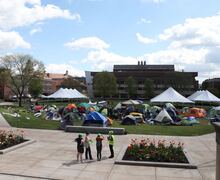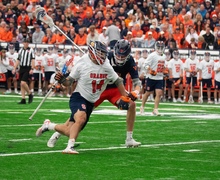‘All alone’
There are moments when Mustafa Mohammed just wants to flee back to Iraq. Often he dreams of going back to Baghdad. But then he calls home, and the dreams end right then. Every time he speaks with his family on the phone, they remind Mohammed that the worsening of the war has made his return impossible.
He recognizes that as a young educated man in America – coming from a nation where 80 percent of the population is illiterate – he is in a right place to help Iraq.
Mohammed arrived in Syracuse one year ago to work on his master’s degree in computer science under the Fulbright Program.
According to research conducted and recently published by TIME Magazine, Iraq’s civil war has forced more than two million Iraqis refugees to foreign lands. Though 66,000 Iraqis have applied for asylum, just 14,000 of them have been granted refugee status by the United Nations and have had their files sent to the State Department for resettlement in America.
So far, 2,700 have been brought to the U.S.
When Mohammed first came to Syracuse, he hardly left his hotel room on James Street. So, Anwar Razzouqi, a telecommunication management master student at Northeastern University and a childhood friend of Mohammed, took the eight-hour train ride to Syracuse. There, he helped Mohammed find a comfortable apartment in a safer part of town. They bought groceries together and took care of class registration and spent sleepless nights talking about home. Finally, once Mohammed was settled, Razzouqi took the train back to Boston.
‘He’s all alone here,’ said Elane Granger, associate director for student services at the Slutzker Center for International Services at Syracuse University. ‘No family, no relatives. He suffered an awful lot and continues to suffer a lot. But he is not a person that will say he needs help. As a mother, I know this is painful.’
So Granger and her daughter Sara Carrasco, a sophomore in The College of Arts and Sciences and one of Mohammed’s closest friends at SU, brought him home for dinner and encouraged him to blend in. They wanted him to feel at home.
Although this would never be home, Mohammed said he knows he is incredibly lucky to have a new life at all.
‘Once you come to America, even if it is for school, you are targeted,’ Razzouqi said. ‘Any affiliation with the U.S. is very dangerous back home, but Mustafa will be fine.’
The Scholar
Handsome and well groomed, with a carefully trimmed goatee, Mohammed is intensely private. Still, the unobtrusive Iraqi caught the notice of many within the Syracuse community.
‘He keeps mostly to himself, but you can tell that he is very intelligent,’ said John Wilde, a salesman at Charney’s, a clothing store where Mohammed often shops. ‘But the things he overcame,’ Wilde adds shaking his head. ‘That’s just amazing.’
On a phone interview, Razzouqi said that because of his self-effacing nature, Mohammed is an easy man to underestimate.
‘But he is one of the most intelligent persons I have ever met,’ Razzouqi said.
The only boy and the youngest of an educated middle-class family of five children, Mohammed grew up in a prosperous neighborhood of Baghdad. Still fearful for the lives of his loved ones, he asks that the name and profession of his father and the name of his neighborhood remain anonymous.
Before the Iraq War he would have never been this ‘paranoid,’ he added.
Life in Baghdad
Life wasn’t always good in Saddam’s Iraq, but for Mohammed and his family, it was relatively easy. It all came crashing down when the war began. Before the war, Mohammed said, the neighborhood was as peaceful as any place on earth – a thriving place of ethnic, racial and religious communities.
Mohammed remembers all that. The young Iraqi speaks in a low, unchanging voice, never pausing to collect his thoughts. When the war came, and Saddam was taken away, the peaceful times left with him.
Today, Mohammed’s neighborhood sits along rotted roads, next to heaps of garbage. Dilapidated brick homes are missing parts of their roofs and stand empty. There is no drainage, no sewerage, no water supply and no electricity. As many as eight in 10 are unemployed, said Mohammed. Most of the children are not in school and few of them live to be legal.
Speaking in slow, methodic English, the young Iraqi painfully tells of witnessing atrocious sights.
Once, after a Shiite shrine had been violated, men in battered pickups with mounted guns swept in, destroying Mohammed’s Sunni-populated neighborhood, shooting and burning alive a throng of inhabitants, including women, children, elderly and infirm, who had found refuge inside a mosque. Over the ensuing days, Mohammed said, the armed men, their heads swathed in traditional black-checkered scarves and black balaclavas, flooded the neighborhood and continued their brutal crackdown, indiscriminately beating and manhandling residents.
The turning point
In Baghdad, Mohammed worked for an American-based company called Reed Incorporated. According to its official website, Reed Inc. offers logistics, security, construction and project management services in high-risk, multi-cultural, Third World environments. Since March 2003, Reed has been operating in Iraq, providing support for the rehabilitation of the Iraqi Media Network (IMN). Mohammed diligently worked his way up from translator to liaison officer between the company, IMN and Iraq’s Ministry of Interior.
Marius van der Riet, Mohammed’s boss at Reed, said that Mohammed often risked his life sneaking through the city to get to the company’s offices located in the International Zone (formerly known as the Green Zone), the highly protected area where coalition forces live and work. Insurgents, most of them followers of al-Sadr, hated those Iraqis that worked for American or international companies. They considered them traitors.
‘It’s very real,’ van der Riet said in a phone interview. ‘Everyday Mustafa had to find a way to meet us at the safe house where a full-armored personal security detail convoy would take him to work in the Green Zone.’
Among Iraq’s Diaspora, Mohammed’s story is a familiar one.
Since the war has started, countless neighborhoods like Mohammed’s have borne the brunt of the war with no clear ethnic or religious lines. Insurgents are splintered into many competing factions and warring among all factions has increased, Mohammed said. ‘(The factions’) main concern is to maintain their fiefs against rivals rather than protecting the civilians they claim to represent,’ Mohammed said. And amid restless insurgency and government attacks, he added, it is the Iraqi civilians – Sunni, Shiite and Kurdish alike – who suffer the most.
One night, after dinner – shortly before Mohammed came to Syracuse – a group of armed men knocked at Mohammed’s metal door and ordered him to step outside his apartment. Once outside, the gunmen put a weapon to his head, read verses of the Quran and ordered him to quit his job or he and his family would be killed.
‘I was working for an American company. (Insurgents) don’t just go after you, they go after your family first,’ Mohammed said. ‘For them, it was the price you had to pay for collaborating with Americans.’
Sitting on the paved brick terrace of an empty local café this summer, Mohammed spoke about his past and how it felt to live in Baghdad.
‘The only way that I can put it is like from the moment that you open your eyes in the morning to the moment that you open your eyes in the next morning, you are scared. You are totally scared.’
A few months after the gunmen came to Mohammed’s apartment, his cousin, Abdul Kader, and his brother-in-law, Haider, were kidnapped in the street of Baghdad in broad daylight. Weeks later, neighbors stumbled across Haider’s mutilated corpse; they found it rotting on a nearby street.
‘We didn’t allow his mother or my sister to see it,’ Mohammed said. Clearly Haider had been tortured for days before being assassinated, he said.
‘I still feel responsible for the death of Haider,’ Mohammed said. ‘I feel so guilty.’
As for Abdul Kader, he has not returned. ‘I have lost hope,’ Mohammed said. ‘I’m pretty sure he’s dead.’
Published on September 10, 2008 at 12:00 pm




